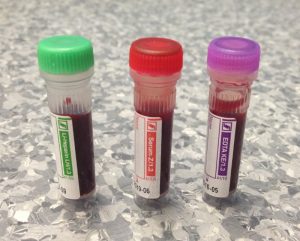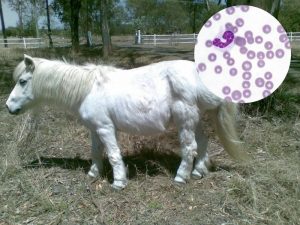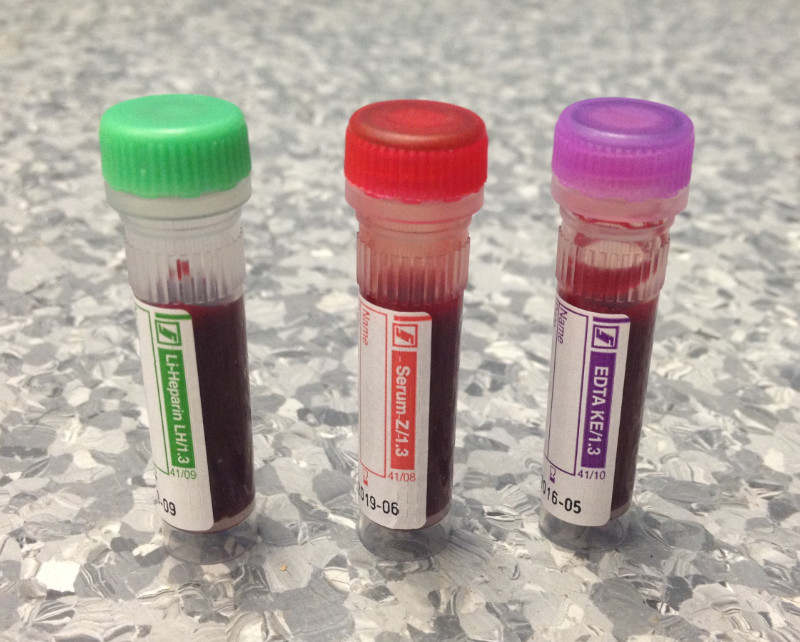
It’s something we do almost every day as veterinarians: collect some blood from one of our patients to try and determine what is going on internally. But have you ever wondered what we’re looking at? This article aims to give you a brief overview of what tests can be performed on blood and thus the benefits of running bloods when your horse is unwell.
There is an enormous list of tests that can be performed but the most common reason bloods are taken is to look at the complete blood count (CBC) and biochemistry values.
Complete Blood Count
A CBC looks at red bloods cells and their composition, as well as white blood cells such as neutrophils, lymphocytes, monocytes, basophils, eosinophils, and platelets. The test you may be most familiar with is looking at your horse’s hydration status. This is looking at the number of red blood cells circulating as a percentage of the total blood volume – this is referred to as the packed cell volume or PCV. If it is too high we may be concerned about dehydration and low blood pressure and if it is too low we may be concerned about anaemia and blood loss.

The white blood cells are responsible for fighting microorganisms that constantly challenge your horse’s immune system such as bacteria, fungi, or viruses. Changes in your horse’s white blood cell count can help indicate that their body is being challenged by one or more of these organisms, however it does not clarify which type of organism is the culprit. Elevation in your horse’s eosinophil count is commonly associated with parasitism or allergies.
Fibrinogen serves as a marker of inflammation and can become elevated before we see changes in the white blood cell count and thus can be very useful in the early stages of illness and infection.
Biochemistry
Biochemistry refers to enzymes, proteins and by products produced by the body and can help us determine where the problem is. The only issue is that some of these enzymes are non-specific to a particular organ and can be elevated due to numerous origins. Thus the interpretation of the results need to viewed in light of the clinical picture and other blood results.
In general, a basic biochemistry profile will let us look at enzymes relating to the health of the kidneys, liver and muscle to name a few. It also lets us look at the total protein which is made up of albumin and globulins. Globulins can be elevated in chronic inflammation and albumin can be low if it is being lost, for example in diarrhoea, or if there is a production issue e.g. liver disease.

For example, aspartate aminotransferase (AST) can be elevated in cases of muscle damage, such as occurs when your horse ‘ties up’, or can be elevated in cases of liver damage. By looking at the other enzymes in the biochemistry profile we can get a better understanding of the cause of the elevated AST. Again, this needs to be viewed in light of the clinical picture and we may also need to utilise other diagnostic modalities such as ultrasound to visualise the liver.
In critically ill patients we will often also look at lactate which is a measurement of the lactic acid production. Lactic acid is produced when cells are operating under anaerobic conditions i.e. poor perfusion by oxygenated blood. This will occur in dehydrated horses, horses with low blood pressure (hypovolaemia) or horses with endotoxaemia.
Glucose levels are particularly important in unwell young foals as they quickly deplete their own stores.
Electrolytes
Electrolytes refer to ions such as potassium, chloride, sodium, calcium and magnesium which are essential to the normal function of cells. Aberrations in their levels can be critical to survival. This is particularly true in the case of foals which are very sensitive to changes in sodium levels. Horses that are on fluids for prolonged periods without eating will often require potassium supplementation.

foal with a ruptured bladder.
Viruses
Your horse’s blood can be tested for viruses, the most topical of which is of course the Hendra virus. However there are long list of other viruses such as Herpes virus, Ross River virus, Kunjin virus, Rotavirus and Coronavirus to name but a few. The problem is that we can not ask for a ‘virus test’ that screens for any and all viruses, but rather we need to request a specific test for a specific virus. Given the long list of viruses that can cause similar symptoms this is not usually economically viable. With the help of the CBC and biochemistry as well as your horse’s clinical signs we may be able to determine what type of microorganism is causing the problem. If this is not possible we may recommend antibiotics in case of a primary or secondary bacterial infection. There is no direct treatment for viruses, but rather just supportive care.
Hormones
We can also test for certain hormones. For example an elevated insulin level can indicate equine metabolic syndrome, elevated adrenocorticotropic hormone (ACTH) can indicate Cushing’s syndrome and an elevated oestrone sulphate level in a gelding can indicate a retained abdominal testicle.
Drug Screening
Finally, your horse’s blood can be tested for drug residues. Certain riding organisation such as Equestrian Australia, perform random drug screening at events for such medications as phenylbutazone, local anaesthetic, tranquilisers and sedation. These can also be tested for at pre-purchase examinations on request. Some of these medications can be detected in the body for weeks after use, whilst others can last even longer such as anabolic steroids.
If you are unfortunate enough to have an unwell horse and your veterinarian recommends bloods hopefully you will now have a better understanding of not only of why they are recommended but also their limitations.



